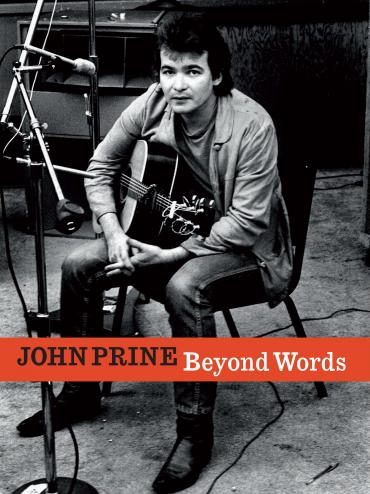THE READING ROOM: New Collection Reveals John Prine Beyond Words

Kris Kristofferson once said that “if God’s got a favorite songwriter, I think it’s John Prine.” Bonnie Raitt remarked that Prine has a “unique ability to haiku it—it’s deceptively insightful.” As more songwriters than Kristofferson and Raitt have pointed out, though, Prine is a songwriter’s songwriter, though he’s often reticent to accept that claim about himself. He often throws that mantle on his good friend and fellow Chicagoan Steve Goodman. In a recent show at the Chicago Theater, which happened just a few nights after the once-hapless Chicago Cubs had snatched a World Series victory out of the deep maw of their history of defeat, Prine came on stage as the house sound system blared Goodman’s “Go, Cubs, Go!” as strobe lights flashed across an audience dancing in the aisles. Prine even laughed slyly and said that he was not so sure that Goodman hadn’t put this whole week together.
As much as Prine defers to Goodman’s songwriting, Prine himself has of course served—along with Townes Van Zandt, Guy Clark, and Jesse Winchester—as the poet laureate of our everyday experience. Those last lines of “Angel from Montgomery”—“How the hell can a person go to work in the morning/and come home in the evening and have nothing to say?”—describe perfectly the ragged ennui imbuing the lives of anyone running the treadmill of work and love, and staring down the burdens of both with blankness. “Hello In There” grows out of Prine’s years of growing up with his grandmother and grandfather. He says that he’d “gravitate over to the side of the room where the old folks were, thinking maybe he could learn something; I respected them.” The song captures and conveys the hollowness descending out of their loneliness: “You know that old trees just grow stronger/And old rivers grow wilder everyday/Old people just grow lonesome/Waiting for someone to say, ‘Hello in there, hello.’” Even his “protest” songs, such as “Sam Stone” and “Paradise.” zero in on the lives affected by war or strip mining. In the case of “Paradise,” Prine cannily connects the emptiness and forsakenness fostered by strip mining to memory; paradise exists now only in a young man’s imagination and can be revisited only by digging up memories of a barren land already sucked dry of its worth.
In the beautiful new collection John Prine: Beyond Words (Oh Boy Records), to be released April 18, Prine curates a selection of 60 of his best-loved songs. If this were simply a songbook, chock full of musical scores with lyrics and chords, there wouldn’t be much news, even if it is John Prine. However, this selection of songs does indeed live up to its title and go “beyond words.” Now, the lyrics and guitar chords for these songs are here for anyone who wants simply to play Prine’s songs. But there is so much more. Included in the book are over 100 photographs from Prine’s personal collection, Prine’s comments on the photographs and on the songs, and copies of hand-written lyrics illustrating the evolution of many of the songs.
One of the book’s most revealing photos comes at the end and shows a younger Prine working out on the pummel horse in gymnastics: “Anything my brothers did, I thought, ‘That’s my brother, I can do that too … ‘ Doug was a gymnast, so I had to become one. When I saw Dave playing the guitar, I learned it. I had no natural ability at either thing, but if I could picture myself doing it, I could do it, if I put enough work into it. That’s why I said if my Dad liked ballet, I would have been Rudolph Nureyev. Shew, am I glad he didn’t like ballet!”
Prine also comments on many of his songs. A photo of a giant steam shovel accompanies the lyrics to “Paradise,” and Prine comments that after the shovel dug out all the coal near the Green River, it was too expensive to have the shovel removed; so, the government buried it there; the “shovel dug its own grave,” he comments. About the song “Let’s Talk Dirty in Hawaiian,” Prine writes, “Me and Fred Kohler wrote this on the patio of the Rock n Roll Hotel in Nashville, back in the ’80s. Fred had this idea for a title and I thought, ‘Oh yeah, I like that.’ I had this little book I’d bought in Waikiki years earlier. One of those goofy little books about how to speak Hawaiian. I thought it would give us some ideas for words. Instead we threw the book away and made up all our Hawaiian words. So they all sounded dirty. ‘Cause this song is basically: ‘Come-on-I-wanna-lay-ya’.”
Reflecting on the development of his songwriting and the acclaim he received, Prine reflects: “It was weird going from zero to the speed of sound. The hardest thing was to accept the compliments—to go from nothing to ‘you’re a genius.’ How many times can you shake your head and shuffle your feet? I was playing with an erector set and inventing the atom bomb by mistake.”
Beyond Words is a keepsake book, a scrapbook that every Prine fan will want since Prine himself gathered these photos and songs and wrote comments on them. As he points out, “these songs are not just words, and these photographs are not just pictures. They are my memories and more … beyond words.” And, indeed, words can’t describe the beauty of these photos, if only because Prine has revealed facets of himself and his music in the poignant and often hilarious comments on the songs and photos.
Speaking of the music, check out this Spotify playlist the folks at Oh Boy Records have put together to complement the content of the book:




